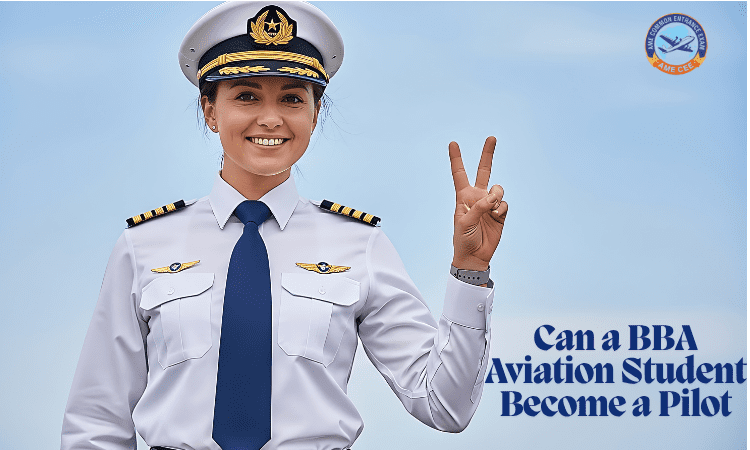Many students pursuing a Bachelor of Business Administration (BBA) in Aviation dream of flying an aircraft rather than managing one. The good news? Yes, a BBA Aviation student can become a pilot.
Your degree gives you a strong foundation in aviation management, airline operations, and air law — all of which align perfectly with a pilot’s professional journey. In this guide, we’ll explain how a BBA Aviation graduate can become a pilot, step-by-step, including eligibility, training, costs, and career paths.
Understanding the BBA Aviation Degree
A BBA in Aviation is a three-year undergraduate program focusing on:
- Airline and airport management
- Aviation safety and regulations
- Ground handling and customer service
- Air traffic management
- Aviation marketing and finance
While it’s primarily a management degree, the course exposes students to the fundamentals of the aviation ecosystem — helping them understand the business side of flying.
Can You Become a Pilot After BBA Aviation?
Yes. After completing BBA Aviation, you can pursue a Commercial Pilot License (CPL) by enrolling in a Directorate General of Civil Aviation (DGCA)-approved flight training academy in India or abroad.
Your BBA degree satisfies the minimum educational requirement (10+2 with Physics and Mathematics) since you would have already cleared those subjects at the 12th level.
Quick answer:
A BBA Aviation student can become a pilot after completing CPL training and passing DGCA exams.
Step-by-Step Guide to Becoming a Pilot After BBA Aviation
Step 1: Verify Eligibility
To enroll in pilot training, you must:
- Be at least 17 years old
- Have passed 10+2 with Physics and Mathematics
- Be medically fit (DGCA Class 1 Medical Certificate)
Step 2: Choose a DGCA-Approved Flying School
Some top DGCA-approved flight schools in India (as of 2026) include:
- Indira Gandhi Rashtriya Uran Akademi (IGRUA), Uttar Pradesh
- Madhya Pradesh Flying Club, Indore
- Bombay Flying Club, Mumbai
- CAE Oxford Aviation Academy, Gondia
- Redbird Flight Training Academy, Baramati
Step 3: Get a Student Pilot License (SPL)
Before actual flying, you must obtain an SPL after a written test on air regulations, navigation, and meteorology.
Step 4: Begin Flight Training
- Flying hours required: 200 hours (minimum)
- Duration: 18–24 months (depending on weather, training pace, and school)
- Cost: ₹25–₹45 lakhs in India; ₹60–₹80 lakhs abroad
Step 5: Pass DGCA CPL Exams
You must clear theoretical exams in:
- Air Navigation
- Air Meteorology
- Air Regulation
- Technical General
- Technical Specific (aircraft type)
Step 6: Obtain CPL & Start Career
Once you earn your Commercial Pilot License, you can apply for roles like:
- Airline Pilot
- Charter Pilot
- Flight Instructor
- Cargo Pilot
Why BBA Aviation Is a Great Starting Point
| Advantage | Description |
| Industry Knowledge | Understands airline operations, management, and safety. |
| Communication Skills | Useful for pilot-cockpit and ATC interactions. |
| Backup Career Options | Can switch to aviation management, ground ops, or training roles. |
| Smooth Transition | Academic background complements flight theory subjects. |
Cost & Duration Comparison
| Training Location | Duration | Estimated Cost | License |
| India | 18–24 months | ₹25–₹45 lakhs | DGCA CPL |
| USA / Canada | 12–18 months | ₹60–₹80 lakhs | FAA / Transport Canada CPL |
You can later convert a foreign CPL to a DGCA license by clearing conversion exams.
Job Opportunities After BBA + CPL
After completing both your BBA in Aviation and Commercial Pilot License, you can apply for:
- First Officer / Co-Pilot (IndiGo, Air India, Akasa Air, Vistara, etc.)
- Charter Pilot (private jets, air taxis)
- Flight Instructor at flying academies
- Corporate Pilot for business aviation firms
- Air Operations Manager (with additional management skills)
Career Growth Path for BBA Aviation Graduates Who Become Pilots
- Co-Pilot / First Officer – Gain 1,500+ flight hours
- Captain – Command commercial flights
- Type Rating Instructor / Examiner
- Airline Training Captain / Chief Pilot
- Aviation Management or Operations Director
With your BBA background, you’ll also be eligible for managerial roles later in your career — a big advantage over candidates without a management degree.
Key Skills Required to Succeed as a Pilot
- Excellent communication and teamwork
- Quick decision-making under pressure
- Strong grasp of physics and math
- Leadership and discipline
- Situational awareness
Frequently Asked Questions (FAQ)
Q1. Is BBA Aviation compulsory to become a pilot?
No. You only need 10+2 with Physics and Mathematics. However, a BBA Aviation degree helps in understanding the business and regulatory side of the aviation industry.
Q2. Can I do BBA Aviation and pilot training together?
It’s possible if you choose an integrated program or enroll in a flight school after completing your degree.
Q3. Is BBA Aviation better than B.Sc. Aviation for pilot training?
Both are valid. B.Sc. focuses more on technical and science aspects, while BBA Aviation emphasizes management and industry knowledge.
Q4. Can BBA Aviation students join the Indian Air Force?
Yes, if they meet eligibility for the AFCAT exam (Flying Branch) and medical requirements.
Conclusion
Becoming a pilot after BBA Aviation is not only possible — it’s a smart career move.
Your management background gives you an edge in airline operations, leadership, and long-term career stability.Whether you choose to fly commercial jets or manage airline operations later, your BBA in Aviation + CPL combination makes you a complete aviation professional.

